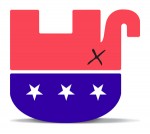
As the dust settles following the biggest election in American history, Republican leaders are left baffled as to how their party has fallen. Even with the next presidential election 3 years away, Conservatives are scanning the political landscape for prominent figures and potential presidential nominees. But with a democratic Congress and president, there are few Republican leaders in the spotlight. The party has an uphill battle to reestablish power, and redefine itself apart from the unpopularity of the previous administration.
A number of events and circumstances have led up to the GOP’s fall from power. After all, the party was enjoying the control of both houses of Congress and the presidency following the 2004 elections, the first time since Herbert Hoover’s era.
In hindsight, social issues and foreign policy of the previous administration were tremendous factors that gave way to the newly elected Democratic congress and president. Now, there is an entire generation of voters who find conservatism itself synonymous with George W. Bush. And for a young voter, 8 years is a long time.
Foremost, Bush and his neo-conservative counterparts redefined the foreign policy of the party in many ways. Unbeknown to many young voters, this “Bush Doctrine” stands very much juxtaposed to the traditional Republican platform. In fact, conservative-leaning presidents in the past have characteristically favored an approach of non-intervention.
Eisenhower was elected to end the Korean War. Nixon was elected with the intention of ending the Vietnam War, only to be overshadowed by Watergate. Later, Reagan would pave the way to peace with the Soviets. One fact is clear when it comes to Americans and their foreign policy—unless under immediate attack, politicians will never have a difficult time running on a platform of peace.
Abandoning many aspects of their party’s platform on foreign policy, Bush and his cronies dogmatically forced ideologies of pre-emptive war upon the nation, all in the name of safety. In reality, safety was compromised in the name of safety. Freedoms were infringed upon, all in the name of freedom. In the time leading up to the 2008 elections, only one GOP nominee hopeful wanted out of Iraq. That was Ron Paul. Although he had much support from young voters, that was not enough to gain the support of the more powerful Republican constituents.
Paul, more than others, recognized this paradox. He states, “How did we win the election in the year 2000? We talked about a humble foreign policy: No nation-building; don’t police the world. That’s conservative, it’s Republican, it’s pro-American – it follows the founding fathers. And, besides, it follows the Constitution.”
What was the Republican Party’s solution for this quandary? John McCain. What better man to oppose the young, well spoken, darling-of-the-media Barack Obama? According to the GOP, it was an old war veteran, who happens to be just as out of touch with America as Oprah Winfrey is with her viewers. To throw $5 a gallon gasoline on the political faux pas fire, Sarah Palin is brought on the scene. In an almost patronizing move by the McCain campaign, Palin is chosen as his running mate, in a calculated attempt to win Hillary fans—an intellectual slap in the face to anyone waiting for a serious running mate.
America’s move from right to left cannot entirely be attributed to foreign policy. The party has long taken pride in their views concerning government regulation. Many view that value to be in opposition their current views on gay marriage. The same goes for governmental control. Republicans have traditionally opposed increasing the power of government. Under the Bush Administration, that was clearly not an objective. And what about all that talk about fiscal responsibility? The deficit has reached levels that defy imagination.
With the Obama Administration still in its infancy, many questions are left unasked. The impression left by the administration will likely play a role in the direction in which the country will move. With much hype, it seems unlikely that Obama himself will be able to sustain his own popularity. With control of the White House and both houses of Congress, the democrats will have no excuses when it comes to passing what they would consider needed legislation.
As of now, there are very few Republicans who are standing out in Congress. That is compounded by the difficulty of passing legislation when one’s party is no longer in rule. In order for the party to reestablish a new paradigm for itself, it will need to rid itself of many connotations attached to its name in the past few years. That means rethinking foreign policy and social freedoms. Lastly, the party will need to present itself more inclusively. With the country growing in diversity, the GOP will likely need to overcome stigmas associated with its name.






